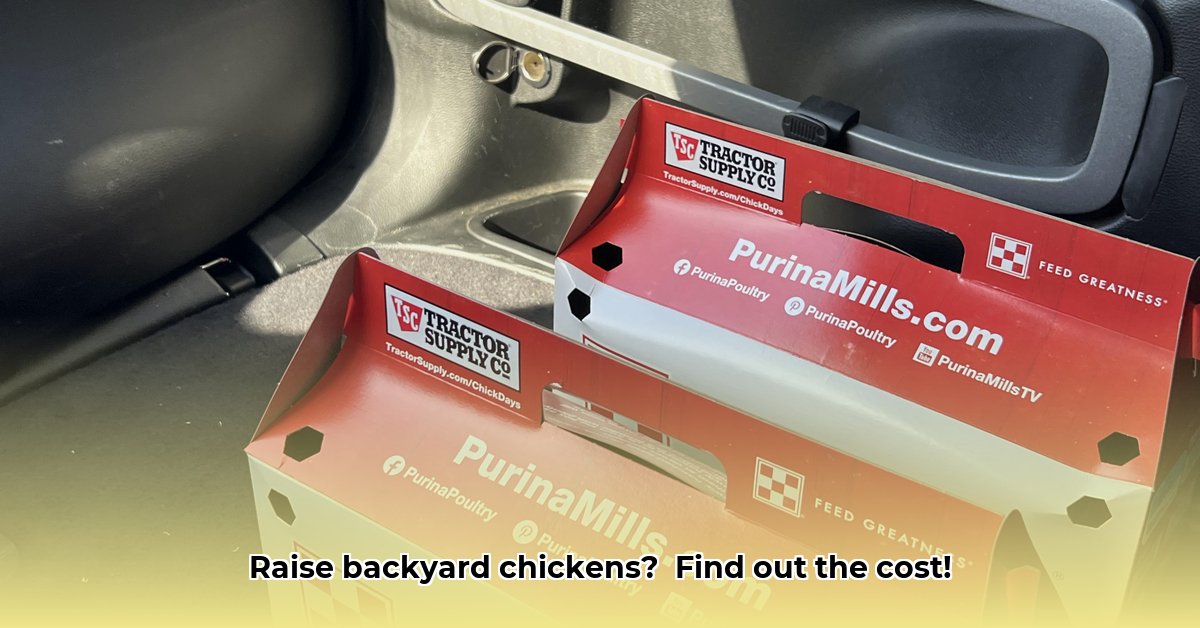
Dreaming of fresh eggs and the cheerful sounds of clucking hens in your backyard? Tractor Supply's chick sales offer an enticing entry point into backyard chicken keeping, but the true cost extends far beyond the initial purchase price. This comprehensive guide breaks down the complete expense of raising chicks from Tractor Supply, from the initial investment to ongoing care, including unexpected veterinary costs. We'll equip you with the knowledge and practical steps to determine if backyard chickens are a worthwhile and sustainable addition to your lifestyle. For information on rooster availability, check out this helpful resource: Tractor Supply Roosters.
Understanding the Price Tag: Tractor Supply Chick Costs
The price of chicks at Tractor Supply varies widely, influenced by breed, chick availability, and seasonal sales like their annual "Chick Days." Expect to pay anywhere from $3 to $8 per chick. But this is only the initial investment. The question is: Are you prepared for the hidden costs? A seemingly bargain price can quickly escalate with unforeseen expenses.
Beyond the Initial Purchase: The Total Cost of Chicken Keeping
The cost of the chicks themselves forms a small fraction of the overall expense of chicken keeping. Essential investments include: a secure coop (potentially costing hundreds of dollars), food and water containers, bedding, consistent feed supplies, and potential veterinary care. Remember, a cheap coop often proves to be the most expensive option in the long run. Inadequate protection from predators can lead to veterinary costs or, sadly, the loss of birds. Feed costs can significantly increase, especially with laying hens requiring specialized, nutrient-rich feed.
Choosing Your Flock: Breed Selection Matters
Tractor Supply generally offers a diverse selection of chicken breeds. Each breed presents unique characteristics: some excel as prolific egg layers, while others are valued for their aesthetic appeal or distinctive personalities. Thorough breed research is critical, considering factors like your local climate and available space. Careful pre-purchase research can prevent future problems and expenses.
Building Your Backyard Flock: A Step-by-Step Guide
Successfully launching your backyard flock involves several key steps:
Coop Construction/Acquisition: Ensure your coop provides a safe, secure environment, protecting your flock from predators like raccoons, foxes, and even neighborhood cats. It needs ample space for comfortable movement and roosting.
Brooder Setup (for Baby Chicks): Baby chicks require a brooder—a warm, safe enclosure—until they mature enough for the main coop. This acts as their protective nursery.
Consistent Food and Water: Always provide fresh, clean water. The type of feed depends on the age and breed of your chickens; carefully follow the instructions on the feed packaging.
Daily Monitoring: Regularly observe your flock for signs of illness or unusual behavior. Early detection of problems saves you money and heartache.
Manure Management: Chickens produce substantial amounts of manure. Implement a plan for responsible disposal, such as composting for your garden or using a designated disposal service. Proper manure management is crucial for both hygiene and environmental sustainability.
Weighing the Pros and Cons: Is Tractor Supply the Right Choice?
Purchasing chicks from Tractor Supply offers advantages and disadvantages:
Pros:
- Breed Variety: Typically offers a diverse selection of breeds.
- Affordable Chicks: The initial chick cost is often relatively low.
- Convenient Access: Tractor Supply's widespread availability simplifies chick acquisition.
- Occasionally Helpful Staff: Staff might offer basic guidance, although expert advice shouldn't solely rely on them.
Cons:
- Hidden Costs: The total cost of chicken keeping can exceed initial expectations.
- Variable Chick Quality: Chick health and quality can fluctuate.
- Disease Risk: The risk of disease transmission exists if biosecurity protocols aren't rigorously maintained.
- Breed Availability: Your preferred breeds may not always be available.
Sustainability: Long-Term Considerations
Responsible chicken keeping requires mindful consideration of environmental impact and chicken welfare:
- Sustainable Feed Sources: Prioritize locally sourced feed to reduce your carbon footprint.
- Composting Manure: Effectively composting chicken manure provides a natural soil amendment for your garden.
- Predator Control: Implement safe and humane methods to protect your birds from predators.
Facing the Unexpected: Preparing for Challenges
Even with meticulous planning, setbacks can occur. Improper handling can lead to health issues, while an unsafe coop leaves birds vulnerable to predators. Heat lamps in brooders pose fire hazards if not correctly managed. While completely avoiding problems is impossible, proactive planning and continuous learning mitigate many potential difficulties. Are you prepared to handle unexpected veterinary bills or other emergencies?
How to Sustainably Manage Backyard Chicken Manure
Responsible manure management is fundamental for both your garden and the environment. Composting offers the most sustainable solution, transforming waste into a valuable soil nutrient. Did you know that properly composted chicken manure is an excellent natural fertilizer?
Composting Chicken Manure: A Step-by-Step Guide
Gather Materials: Acquire a compost bin (or designated area), brown materials (dried leaves, straw), and green materials (chicken manure, grass clippings).
Layered Composting: Create layers of brown and green materials, incorporating chicken manure evenly.
Maintain Moisture and Aeration: Regularly turn the compost pile for aeration and moisture balance.
Temperature Monitoring: The ideal temperature is between 130-160°F (54-71°C).
Harvesting Compost: Once the process is complete (often taking several months), you'll have nutrient-rich compost.
Remember, raising chickens involves commitment and responsibility. Thoroughly consider the financial and logistical implications before bringing your feathered friends home. The initial cost from Tractor Supply is just one aspect of a multifaceted, rewarding experience.